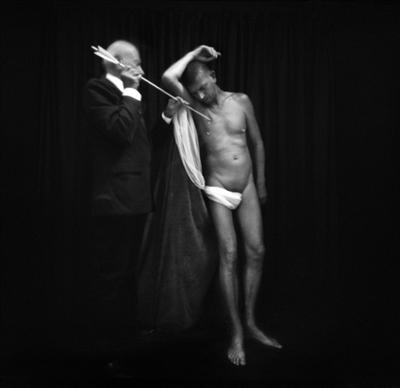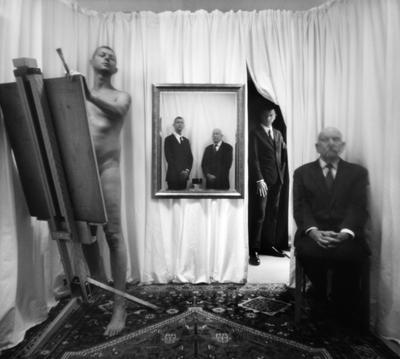elegy for an aesthete
Dimensions
variable
"Man is least himself when he talks in his own person.
Give him a mask, and he will tell you the truth". Oscar Wilde
To imagine the world through the eyes of another is to free oneself of constraints, of the norms and conventions that bind us as a society. In Oscar Wilde’s case, these would be the Victorian values that would ultimately mark his downfall.
Wilde’s reflection on the artist’s voice interpreted through another character could be viewed as analogous to the masking or closeting of his own desires in a period where one’s social persona and reputation could be ruined by the suggestion or slur of homosexuality.
The flamboyant life as an aesthete provided a cover, to be hidden in plain sight, until he was exposed by the libel of sodomite, or what the Marquis of Queensbury collectively referred to as ‘snob queers’1.
More than a century on, while some things have greatly improved in attitudes to sexuality, being open about one’s sexual identity can, for some, be difficult to confront.
My husband Peter and I perform ideas of queerness associated with our age and our working-class background. Peter grew up in a time where same sex love was against the law. I was 2 years old when the 1967 act to partially decriminalise homosexuality between men came into being in England and Wales. But a change in the law didn’t immediately lead to social acceptance. So, in adolescence, I learned to internalise and live a life of pretence.
The staged tableau incorporate cliché, sentimentality, stereotypes, and transcoding. Collectively, these become a performance of belonging and otherness influenced by Freud’s description of uncanny in terms ‘heimlich/homely and unheimlich/unhomely’.2
Wilde’s novel the picture of Dorian Gray seemed prophetic of the fate that befell him. The Faustian tale of a beautiful young man who remains young while his painted portrait absorbs his sins and indiscretions seems in keeping with the decadent lifestyle of an aesthete. The novel was infamous in its day, and during his stay in prison Wilde was addressed as his main protagonist. Oscar replied ‘not Dorian Gray, but Lord Henry Wotton.’3
It is interesting to think that Wilde pictured himself as the hedonist who was a corrupting influence on Dorian. In real life it’s been argued that Lord Alfred Douglas or Bosie, the beautiful youth often compared to Dorian, was the corrupting influence in Wilde’s life and downfall.
The mask of Dorian allowed Wilde to explore the hypocrisy of Victorian England.
Dorian’s mask was the beauty of youth which remained untainted, while his portrait, his true self, festered in the attic- fuelled by desire and corruption.
On release from Reading gaol, Oscar would spend the last 3 years of his life in exile. His adopted countries were France and Italy. Paris would be his final resting place, memorialised by Epstein. France was a country more accepting of homosexuals than Britain in the nineteenth century.
1. Richard Ellmann - Oscar Wilde p426
2. Freud - the uncanny
3. Richard Ellmann - Oscar Wilde pp.486-7
Helping Artists Keep Going
Axis is an artist-led charity supporting contemporary visual artists with resources, connection, and visibility.








